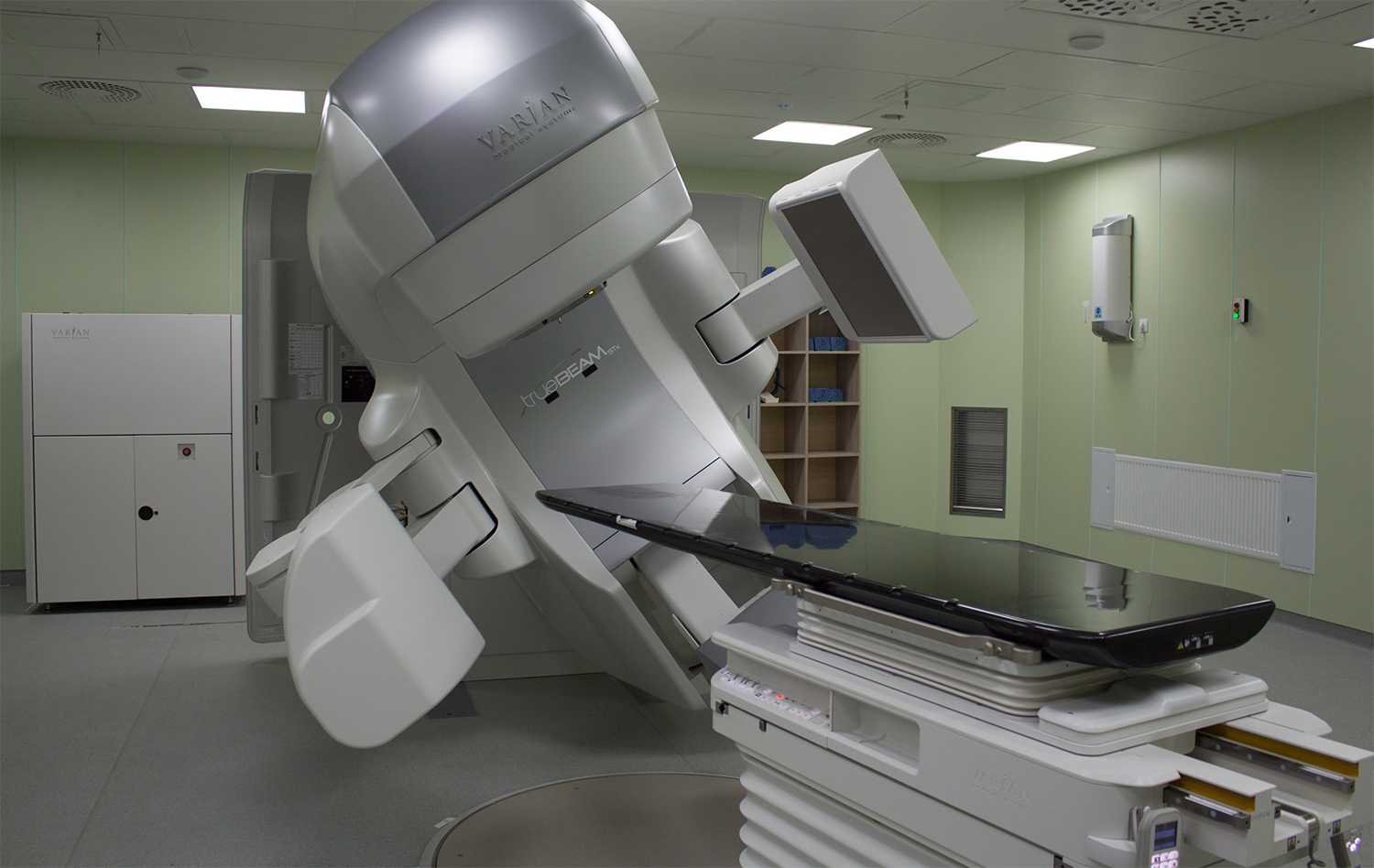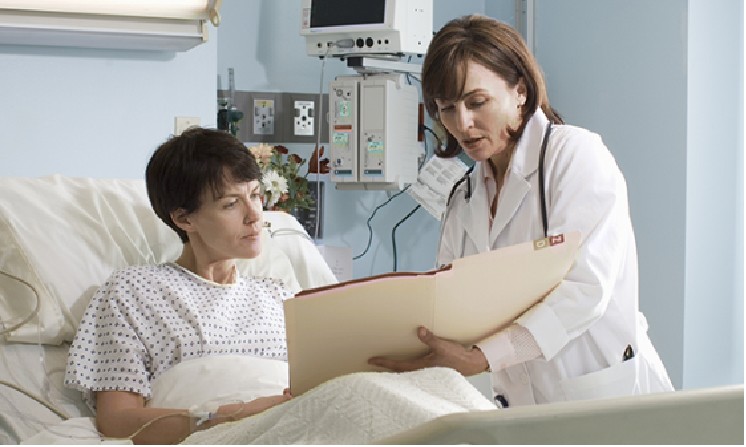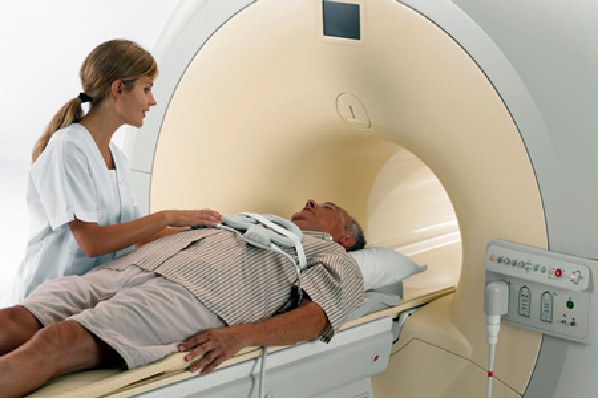Radiotherapy
Radiotherapy for cancer
What is radiotherapy?
Radiotherapy (x-ray therapy, telegammatherapy, election therapy, neutron therapy and others) is utilization of a special kind of electromagnetic radiations of beams of elementary nuclear particles capable of killing tumor cells or suppressing their growth and division.

Some of the normal cells appearing in the radiation area are also damaged but most of them are able to restore.Tumor cells divide more rapidly than the surrounding normal cells, that is why radiation is more destructive for them. Just these differences determine the efficacy of cancer radiotherapy.
What kinds of cancer are treated with radiotherapy?
Radiotherapy is employed for treatment of various kinds of cancer. Presently, more than a half of patients with his or that kind of cancer are successfully treated by means of radiation.
Radiation may be used as a monotherapy. Sometimes radiotherapy is conducted prior to surgery to reduce the tumor size or following it to destroy the remaining cancer cells. To destroy the tumor, the doctors rather often combine radiation with antitumor drugs (chemotherapy).
Even in the cases of impossible removal of the tumor, radiotherapy makes it possible to reduce its size, to alleviate the pain and to improve the general condition.
Facilities for conducting radiotherapy
To carry out radiotherapy, special sophisticated machines are employed, enabling to direct the curative energy flow to the tumor. These machines differ in principles of their operation and are used for different purposes. Some of them are used for the treatment of superficial cancer, others are more effective for tumors locating deep in the body.
Your doctor will make the decision which of the machines is better to use for your treatment.
The radiation source may be delivered to the affected site in several ways.
If the source
- Is at some distance from the patient`s body, the radiation is called external-beam;
- Is installed in some cavity, it is intracavitary;
- Is introduced directly into the affected area in the form of liquid , wire needle, probe , it is interstitial
Radiotherapy stages
The radiotherapy procedure is conventionally divided into 3 stages:
- Radiation pretreatment
- Radiation treatment
- Postradiation period
Each of the stages has its peculiar features regulating your behavior. Following the regulations will improve the treatment outcomes and reduce the rate of side effects.
Radiotherapy as a process
1. Preparing for the treatment

Additional examinations are made in this period of time to precisely define the site and to assess the condition of the normal tissues adjacent to the lesion.
Prior to the radiotherapy course, the radiation doses are thoroughly calculated and its regimens are determined which may ensure maximal destruction of tumor cells and protection of normal tissues in the body regions subject to exposure.
Your doctor will decide what radiation dose you need, how it is to be delivered, and how many treatments will be required for this.
An entire group of highly skilled specialists (physicists, dosimetrists, mathematicians) assists in carrying out these complicated calculations. Sometimes several days are needed to make the decision. This procedure is called planning.
In the course of simulation (planning), you are requested to lie quietly on the table, until the doctor has defined the radiation field using a special X-ray unit. Such sites may be several. The radiation fields are designated with dots or lines (marking), using for this special ink. This marking should remain on the skin to the end of the treatment. That is why try not to wash it while having a shower. If the dots and lines are becoming obliterated, tell the doctor about it. Don’t touch up the dots yourself.
Even in the radiation pretreatment period:
- You should not apply iodine tincture and other irritative agents to the skin regions to be exposed to radiation;
- You shouldn`t get sunburnt;
- If you have intertrigo or skin rash, show it to the attending doctor. He\she will prescribe appropriate treatment (powder, ointment, aerosol);
- If radiotherapy is intended for treatment of a maxillofacial tumor, preliminary oral cavity sanation is needed (therapy or extraction of carious teeth). This procedure is of paramount importance for prevention of radiation morbidity in the oral cavity.
2. The way radiation treatment is being conducted
You will be requested to lie quietly on the table, until the radiologists has defined the radiation field using a special X-ray unit. Such sites may be several. The radiation fields designated with dots or lines ( marking)using special ink for this. This marking should remain on the skin to the end of the treatment. That is why try not to wash it off while having a shower. If the dots and lines are becoming obliterated, tell the doctor about it. Don’t touch up the dots yourself.
Even in the radiation pretreatment period, you should not apply iodine tincture and other irritative agents to the skin regions to be exposed to radiation. Don’t get sunburnt. If you have intertrigo or skin rash, show it to the attending doctor. He\she will prescribe appropriate treatment ( powder, ointment, aerosol).
If radiotherapy is intended for treatment of a maxillofacial tumor, preliminary oral cavity sanation is needed (therapy or extraction of carious teeth). This procedure is of paramount importance for prevention of radiation morbidity in the oral cavity.
Radiotherapy: how the treatment is going on
1. Selection of the radiotherapy regimen
The course commonly lasts for 4 to 7 weeks. In some cases of preoperative radiotherapy aimed at reducing the tumor size or patient`s relieving, the duration of the course is 2-3 weeks.
Generally, radiation treatments are administered 5 times a week. Sometimes to protect the normal tissues in the radiation area, the daily dose is divided into 2-3 fractions. The two-day break in the weekend allows normal tissues to restore.
The decision concerning the total radiation dose and the number of treatments is made by the radiologists doctor taking into account the tumor size and site, and site, its type, your general condition and other kinds of treatment administered.
2. How the procedure is going on
You will be requested to lie on the table or sit in a special armchair. The radiation areas will be precisely defined by the fields previously designated on the skin. Therefore you ought not to move being exposed to radiation. You must lie quaintly, without any tension with natural and even breathing. You will stay in the Room for 15-30 min.
Prior to the machine being turned on, the personnel goes over to the adjacent rooms and watches you by TV or through a window. You can communicate with them by a loudspeaker.
Some parts of radiotherapy machine may move and make noise while operating. Don’t worry: the whole procedure is under control.
The radiation itself is painless. If you happen to feel bad in the course of the radiation procedure, tell the doctor about it without delay, taking no actions on your own. The unit can be switched of any time..
You might feel alleviation of pain ( if you suffer it) at the very beginning of the treatment. As a rule, however, the maximal curative effect of radiotherapy occurs after the treatment being completed.
To achieve a beneficial effect of the therapy, it is of great importance to undergo all the treatments prescribed.
How to behave in the course of radiotherapy
The response of the body to radiotherapy is individual. In any case, however, the radiotherapy procedure is a considerable burden for the body. That is why you may develop the sense of fatigue in the course of the treatment. For this reason, you need more rest. Go to bed whenever you feel you need it.
This sensation usually ceases 4 to 6 weeks after the treatment completion. Mind you ought not to avoid physical activity all together: it enhances the host defenses and resistance to adverse effects. You may obtain recommendations for selecting and measuring out physical activity from you doctor and exercise therapy specialists.
During the treatment you are to observe some regulations
- Eat well. Follow a balanced diet ( the proportion of proteins, fats and carbohydrates is 1:1:4). You need to take daily 2.5-3 L of liquid together with food ( fruit juices, mineral water, tea with milk).
- Give up bad habits ( smoking, consuming alcohol) at least for the time of treatment.
- Don’t wear clothes fit close to the radiated body regions.) Synthetic and woolen clothes are utterly undesirable. Worn loose cotton clothes are preferable. If possible, the radiated skin parts should be kept uncovered.
- More time is to be spent out of -doors.
- Closely watch the state of your skin. Sometimes the radiated skin looks tanned or darkened. By the end of the treatment, the radiated body regions may become excessively moist (especially in flexions in some cases. It mainly depends on your personal sensitivity to radiation. Please inform the doctor or the nurse about all the changes you have noted. They will give relevant recommendations.
- Without consulting the doctor, don’t apply soap, lotions, deodorants, ointments, cosmetics, perfumery, talc or the like to the radiated body regions.
- Don’t rub nor scratch the radiated part of the skin. Don’t put warm or cold things (hot-water bottle, ice) on it.
- Coming out, protect the radiated skin area from sunshine (light clothes, a hat with wide brims).
What awaits the patients after radiation treatment?
Side effects of radiation
Radiotherapy, just as any other kind of treatment , may cause general and local ( in the area of tissue radiation exposure) side effects. These events may be acute (transitory, occurring in the course of treatment) and chronic ( developing some weeks or even years after the treatment completion).
Radiotherapy side effects are most common to manifest in tissues and organs directly exposed to radiation. Most of the side effects developing in the course of treatment are mild and cured with medication or proper diet. As a rule , they vanish during 3 weeks after radiation treatment. Many patients develop no side effects at all.
In the course of treatment, the doctor is monitoring your condition and the effect of radiation on body functions. If, while being treated, you experience some uncommon symptoms (cough, sweating, fever, strange pain), be sure to report it to your doctor or nurse.
General side effects of radiotherapy.
Emotional state 
Almost all patients treated for cancer are under emotional stress of this or that degree. The most common feelings are depression, fear, melancholy, loneliness, sometimes aggression. As the general condition is improving, emotional impairments become dull. Make contacts with your family members and close friends more frequent. Don`t retreat into yourself. Do you best to participate In the life of people surrounding you, be helpful to them and don`t reject their assistance. Have a talk with a psychotherapist. He\she may recommend some acceptable ways of stress removal.
Fatigue
The feeling of fatigue usually begins to be precepted some weeks after the treatment start. It is associated with considerable physical burden on the body in the process of radiotherapy, and also with stress. That is why your general activity should be somewhat decreased for the time of radiotherapy administered, especially if you used to work intensively. However, don`t give up your household occupations entirely, take part I the family life. Deal more frequently with the matters to you liking, read more, watch TV, listen to music, but no longer than you feel tired.
If you don’t want outsiders to know about your treatment, you can take a leave for the treatment period. If you choose to go on with your work, talk to you superior about the possibility of changing your work schedule. Do not hesitate to seek help from your relatives and friends. They are sure to understand your condition and to render the assistance needed. The feeling of fatigue is gradually passing away after the completion of the treatment.
Changes in blood
With considerable body regions being exposed to radiation, the amounts of white blood cells, platelets and red blood cells may temporarily decrease. The doctor is monitoring the hematosis function by the blood count findings. Sometimes, with occurrence of marked changes, the treatment is interrupted for one week. In rare cases, medication is prescribed.
Loss of appetite
As a rule, radiotherapy does not inflict nausea and vomiting. However, loss of appetite may occur.You ought to understand that you need to consume a sufficient amount of food to restore the damaged tissues. Even without the feeling of hunger, you must do your best to secure high-caloric feeding with increased protein content. It will enable to better manage the side effects and to improve the outcomes of cancer treatment.
Some pieces of advice concerning the nutrition during the radiotherapy period:
- consume diverse food frequently but in small portions. Eat whenever you want to, disregarding the daily routine.
- Increase the caloric value of food: add more butter if you like its smell and taste.
- to work up your appetite, use various causes.
- in the intervals between food intakes, consume kefir, milk mixed with butter and sugar, yoghurt.
- Drink more liquid, preferably juices.
- Always have a little store of foodstuffs you like (permitted for storing in the clinic providing treatment) and eat them whenever you wish you would eat something .
- While eating, try to set conditions raising your spirits (turn on TV, radio, listen to your favorite music).
- ПAsk your doctor for advice whether you may drink a glass of bear with your meal to work up your appetite.
- if you have some diseases requiring certain diets seek counsel from your doctor how to diversify your dietary intake.
Cutaneous side effects
Skin responds to radiation by its reddening in the exposure area. The development of this effect is to large extent determined by your personal sensitivity to radiation. The reddening usually appears in the second/third week of the treatment. After the completion of radiotherapy, the skin in these areas becomes a little dark, as if sunburnt.
To prevent the skin reaction being too pronounced, you may use vegetable and animal oils ( Detsky and Barkhathy creams, aloe emulsion) to be applied to the skin after a radiotherapy treatment.
Before a treatment, the cream remains must be washed off with warm water. Mind that the skin should be dubbed with appropriate ointments and creams not from the first days of radiation treatment but later on when the skin starts reddening.
Sometimes in the cases of intense cutaneous reaction, a short break in the treatment is made. More detailed information about skin care may be obtained from your attending doctor.
Side effects on oral cavity and throat
If you maxillofacial area or throat are exposed to radiation, gingival, oral and throaty mucosa may redden and inflame in some cases, and dry mouth and swallowing tenderness may also occur.These events usually take place in the second/ third week of the treatment.
In most of the cases they pass away by themselves a mouth after radiotherapy being completed.
You may alleviate your condition if you follow recommendations given below:
- Give up smoking and alcohol during the treatment, as they also cause irritation and dryness of oral mucosa.
- Rinse the oral cavity no less than 6 times a day ( after sleep, every food intake, before night). The solution is to be of room temperature or cooled. The information about solutions preferable for rinsing the oral cavity may be obtained from the attending doctor.
- Twice a week, clean your teeth with a soft toothbrush or a cotton pellet, doing it carefully, without strong pressure. Having used the brush, wash it thoroughly and keep dry.
- Consult a dentist concerning the choice of the toothpaste needed. It shouldn’t be harsh nor irritate the mucosa.
- If you have removable dentures, take them off before radiotherapy treatment. I case of their rubbing your gums sore, you`d better give them temporarily up.
- Don’t consume sour and pungent foodstuffs.
- Do you best to eat soft food ( child food, mash, porridge, pudding, jelly and the like. Hard and dry food to be soaked in water.
Side effects of the breast
The most common side effect of radiotherapy for breast tumor is cutaneous changes ( see the section” Cutaneous side effects). Besides following the above recommendations for skin care, you should give up wearing a brassiere for the treatment period.Radiation exposure may cause painful sensations and edema in the breast area which will cease or gradually decrease after the treatment being completed.
Having been radiated, the breast may sometimes get larger (due to liquid accumulation) or get smaller (as a result of tissue fibrosis).
In some cases, the breast deformation may remain for the rest of life. More details about the nature of changes in the form and size of the breast may be obtained from the attending doctor.
Radiotherapy may result in worsening shoulder movements. Consult an exercise therapist about the exercises to be done to prevent this complication.
In some patients, radiotherapy may cause edema of the arm at the side of the breast radiated. This edema may develop even 10 years or more after completion of the treatment. That is why you have to keep vigilant watch on the arm condition and to follow some rules of behavior:
- Avoid lifting weights (nor more tan 6-7 kg), jerky movements demanding strenuous efforts (pushing, pulling), carrying a bag across the shoulder at the side of the breast radiated.
- Don’t let measuring arterial pressure and making injections (blood sampling) in the arm at the side of the breast radiated.
- Don’t wear closely fitting decorations and clothes on this arm. In case of incidental injury of the arm skin, handle the wound with alcohol (but not with iodine alcoholic tincture!) and stick bactericidal plaster to the wound or apply a bandage to it..
- Protect the arm from direct sun beams.
- Maintain your optimal weight by means of balanced nutrition with low salt content and high dietary fibre content.
- Even with the occurrence of transitional arm edema passing away after night sleep, see your doctor without delay.
Side effect on thoracic organs
During the course of radiotherapy, you may have deglutitive problems because of radiation inflammation of esophageal mucosa. You can ease food intake if you take food more frequently, in small portions, diluting thick food and cutting hard one into small pieces. You may swallow a small piece of butter before eating to relieve deglutition.
You may develop dry cough, temperature rise a charge in sputum colour, dyspnea. On noticing these symptoms, let your attending doctor know about them without delay.
Side effect on rectum
This may occur radiotherapy for rectal cancer or cancer of other small pelvis organs. The radiation damage of intestinal mucosa may cause pain and bloody discharge, especially with dyschesia.
To avoid or reduce the intensity of these phenomena, you ought to take preventive measures against constipation. It is easily achieved by arranging an appropriate diet. You need to additionally include kefir, fruit, carrots uncooked, stewed cabbage, prunes infusion, tomato and grape juices in your dietary ration.
If you experience stool retention in spite of following the above recommendations for more than 1 -2 days, be sure to inform your attending doctor about it.
Side effect on urinary bladder
Sometimes radiotherapy may cause inflammation of urinary bladder mucosa. This may lead to frequent painful urination, body temperature rise. Occasionally the urine becomes reddish. On noticing these symptoms, let your doctor know about them. These complications need special medication.
What is your conduct to be like after the completion of radiotherapy (the post radiation period)
After the radiotherapy course being completed, it is very important to periodically check up the outcomes of your treatment. You should regulatory undergo follow-up examinations by radiologist or the doctor you were referred by for treatment. The time of the first follow-up examination will be appointed by the attending doctor at discharge.
Further follow-up will be scheduled by the doctor from outpatient clinic or dispensary. The same specialists will prescribe you subsequent treatment or rehabilitation, if needed.
In the presence of the following symptoms you are to see your doctor without awaiting the regular follow-up examination:
- Onset of pain without ceasing by itself for several days;
- Nausea, diarrhea, loss of appetite
- Body temperature rise, cough;
- Arising of tumor, swelling, unusual skin rash;
- Developing of extremity edema at the radiation side.
Care for radiated skin
On completion of the radiation treatment. The radiated skin has to be protected from traumas and sun beams for no less than a year. Be sure to dub the radiated skin areas with nutritious cream 2-3 times a days, even in case of its being healed after treatment. Don’t handle your skin with irritating substances.
Ask your doctor to counsel you about the best cream to be used. Don’t try to rub out the marks remaining after treatment, they will gradually disappear by themselves. Give preference to shower rather than to bath. Don’t use cold or hot water/ taking a shower, don’t rub the radiated skin areas with wisp of bust. In case of persistent irritation of radiated skin, consult a doctor. He/she will prescribe you relevant treatment.
Mind that slight pain in the radiated region is a common and rather frequent phenomenon. With its appearance, you may take light analgetics. With intense pain. You need doctor`s counseling.
Communications with relatives and friends
Being subjected to radiotherapy, your body does not become radioactive. One must also clearly adopt the idea that oncological disease is not infectious. For this reason, don’t afraid of mixing with other people, friends and relatives.
If you need it may invite your closest people for a joint talk with your doctor.
Intimate relations
In most of the cases, radiotherapy has no considerable impact on sexual activity. The waning interest in intimate relations is mainly determined by general physical weakness ensuing from this treatment, and by stress. For this reason, do not elude intimate relations being an important component of full life.
Occupational activities
Some of the patient don’t quit jobs at all in the course of radiation treatment in outpatient settings. If you were not at work during the treatment, you can go back to your professional activities as soon as you feel that your condition allows you to do so.
If you work is associated with intensive physical activity or harmful occupational conditions, you`d better think of changing the occupational conditions or profession itself.
Spare time
Dedicate more your time to relaxation. In due course, you will restore your strength, so don’t undertake full-scale physical activity at once. Attend theatres, exhibitions. This will help you distract your mind from your cares.
Make it a rule to take constitutionals out-of-doors (walks in a ark, in woods. Spend more time for communicating with friends and relatives. With your attending doctor`s consent, consult an exercise therapy specialist and a psychotherapist. They will help to select an adequate physical activity (curative gymnastics) and offer methods of overcoming stress.
Conclusion
We do hope that this information will be helpful for you to get rid of excessive mental stress, to facilitate undergoing the radiotherapy course and to realize what awaits you after it. All this is contributing to your recovery.
More detailed information concerning the issues of your level of health may be obtained from your attending doctor.
Treatment outcomes. Photos before and after it.
According to CT findings, the tumor was inoperable before treatment. After preoperative chemoradiotherapy, a successful operation was subsequently performed.
Rectal tumor. CT before treatment.
CT after chemoradiotherapy




In radiotherapy for pelvic organs, IMRT (intensity modulated radiotherapy) enables to achieve uniform dose distribution and to considerable reduce the dose on urinary bladder and small intestines. In this way, conditions are created for decreasing toxicity and improving the tolerance of the treatment provided.
Anal canal cancer. CT before treatment.



In chemoradiotherapy for anal canal caner, VMAT techniques ( volumetric modulated are therapy enables to achieve highly conformal isodose distribution and improve the tolerance of the treatment ( to avoid the development of toxic effects on the bowels( diarrhea), urinary bladder ( cystitis) and genitals).
CT after chemotherapy

In postoperative radiotherapy for breast cancer, IMRT reduces the risk of heart and lung tissues damage.












